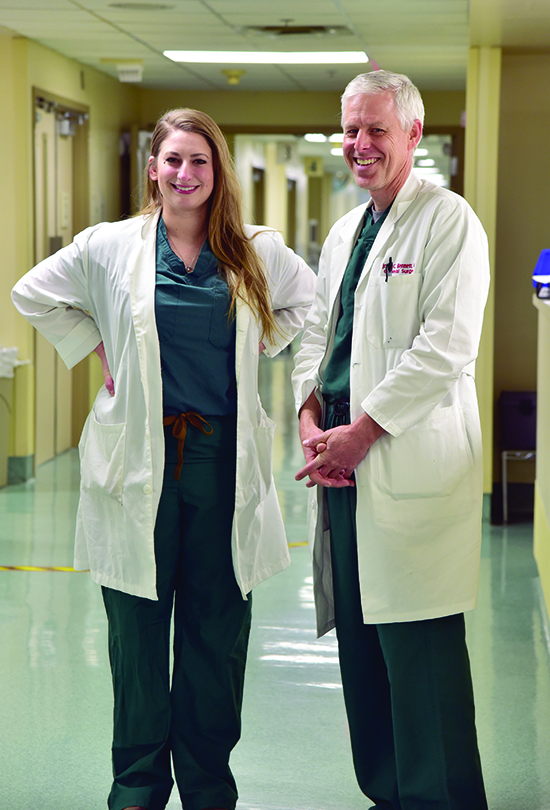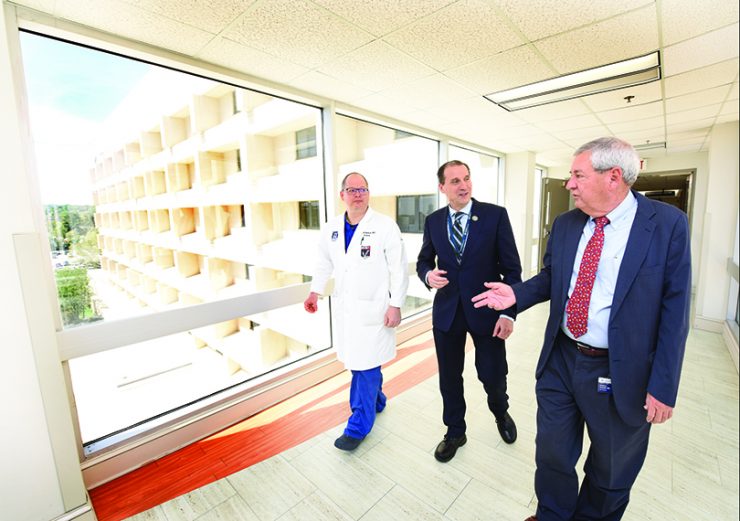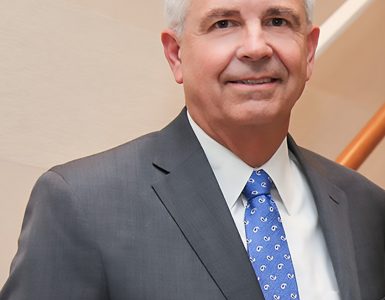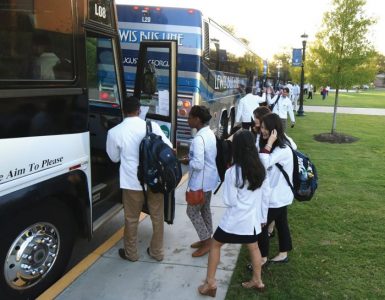New Rural Surgery Initiative aims to meet a vital need to improve care in communities
For Dr. Steven Holsten, trauma surgeon and general surgery residency program director at the Medical College of Georgia, the idea of launching a residency program in rural Georgia really was all about providing better surgical care for those families.
“The data shows that in Georgia, in our rural medical populations, citizens are underserved,” says Holsten, who in February presented a study at the Southeastern Surgical Congress that found that a greater distance from a hospital correlates to the worst outcomes for unplanned surgeries. “We don’t have the facilities and we don’t have the providers to care for those folks.”
According to the Georgia Board for Physician Workforce, in 2017, 78 Georgia counties had no general surgeons. Then add in the fact that more than 35 percent of general surgeons in Georgia are 60 and older, according to the Association of American Medical College’s latest Georgia Physician Workforce Profile.
So the few surgeons in rural areas will soon become even fewer. “We’re looking at a crisis in surgical providers in the state of Georgia,” he says.
For Dr. Doug Patten, associate dean of MCG’s Southwest Campus based in Albany, it goes back even further to about 10 years ago when as chief medical officer at Phoebe Putney Memorial Hospital, he started asking questions about establishing residency slots in Albany.
“I had any number of conversations about the incredible opportunity to have residents rotating here in Albany,” says Patten, who has lived and practiced in his adopted hometown since 2004. “Generally speaking, it was not well received. It was thought to be too much trouble, and there was not enough interest from any single department to do anything.”
So when Dr. Charles Howell, ’73, chair emeritus of the MCG Department of Surgery, sat down a couple years back with Patten to ask: “What’s it going to take to get surgery residents here?”, Patten had an easy answer. He told Howell: “All you have to do is say yes.”
Dr. John Bennett, ’96, a general surgeon and attending at Phoebe Putney Memorial Hospital, remembers being surprised when the idea of teaching MCG surgical residents was brought to him. Not that it was new to him—he’d taught residents before at Wright-Patterson Air Force Base in Dayton, Ohio, and then later at the University of Virginia Health System.
He echoes what his partners felt at the time: “We weren’t so sure—there’s a lot of work to do and the water faucet doesn’t turn off, it keeps running. There are always volumes of patients to take care of”—and it’s just a simple fact that having a resident can slow you down.
But there was this fact too: “There was also this feeling of, ‘Hey, we need to do this because we owe it to the system. Someone did it for us.’”
‘Georgia Is Our Campus’
Just about every time someone stands up to give a presentation about MCG, Georgia’s public medical school, these words tend to be uttered: “Georgia is our campus.”
For all those involved in developing and managing the Rural Surgery Initiative — Holsten, Patten, Bennett, Howell and current MCG chair of surgery Dr. Daniel Albo — one of the goals is to take advantage of the many training opportunities available across the state, not just in Augusta. The initiative also supports MCG’s plan to offer seven general surgery slots by 2020, compared to five now. The Georgia Legislature recently put its stamp of approval on the plan, earmarking $350,000 annually to support the program.
While MCG is taking the lead on pursuing these opportunities for resident education statewide, it’s not alone. Holsten likens it to a gold rush, where if MCG doesn’t stake its claim, competing institutions will. If that happens, says Holsten, “over the course of 10 years our educational influence, our clinical influence in the state will diminish … as a statewide institution, this is important. Even more important is providing care to patients who otherwise wouldn’t get it. The real bottom line is these patients need surgeons.”
Another goal — based on those startling statistics Holsten shares about the state of rural health care in Georgia — is to change the way health care is delivered in rural towns where hospitals are few and far between, and to attract young practi-tioners to open practices where they train.
Nationally, Georgia isn’t as bad off as some states. According to a 2017 report by the Association of American Medical Colleges, when it comes to the percentage of residents who train in a state and then remain in that state, Georgia is 15th, at 48.9 percent. Compare that to tiny New Hampshire, where only about 28 percent of its residents stay in the state to practice.
Tactics such as giving residents the opportunity to experience practice in rural settings can work, but they must be in tandem with other strategies, such as ensuring the environment is one where the physician would want to live and raise a family and promoting an attractive professional environment, said AAMC chief health care officer Dr. Janis Orlowski in an interview with STAT.
That’s exactly what MCG’s program hopes to do. The Rural Surgery Initiative was launched last fall for third- and fourth-year surgical residents spending one or two months out of the year in Albany at Phoebe Putney Memorial Hospital. As the program expands, organizers want to offer it to other resident classes and are also planning for additional sites in Americus, Moultrie, Rome and Thomasville.
As the initiative’s site director, Bennett ensures that residents feel emboldened to scrub in on any case they want with him, his two partners and the local OB/GYN group in Albany, but also focuses on helping them feel welcome, which has even included inviting them home for dinner with his wife and children. “I was trying to imagine it for me,” he says. “It might be lonely for me to be in Albany with none of my fellow residents.”
As someone who grew up in a small town in Louisiana, who went on to practice in a small town in Georgia, Cordele, before settling in Albany, Patten can also speak from first-hand experience to both residents and medical students at the Southwest Campus about the benefits of a smaller community.
“We spend a lot of time talking about physician burnout,” he says. “Practicing in a small community environment, regardless of your specialty, offers the opportunity to enrich your practice because you know your patients, their families, their circumstances. You feel like you’re part of their lives, more so than in a transactional relationship that you might experience in a larger city. That relation-ship and that experience in a smaller community is the best antidote for physician burnout that I have ever seen.”
‘We Have a Bunch of Sick Folks’
Then there’s the caseload. When Bennett described his work as a water faucet that never gets turned off, he was referring to a never-ending flow, including laparoscopic cholecystectomy or gall bladder removal, breast cancer surgery and hernia repairs — what surgeons might call “bread-and-butter” cases but that are life-changing for the patients who need them. “We have a bunch of sick folks in Albany,” he says. “They’re just as sick [as those in urban areas].”
As a tertiary medical center, Augusta University Health surgery residents see a large share of complex cases such as second repairs. But one of the most important benefits of the Rural Surgery Initiative is exposure to these high-volume, lower-acuity cases that provide an essential basis to a general surgeon’s training. “There [at a rural site], they might do 100 cases in a month, where here it might be 25 to 50,” says Holsten.
Holsten has already seen how that significant increase in case volume has boosted resident satisfaction in just the first few months of the initiative. “The residents love it, and the faculty have had good feedback as well,” he says.
Bennett says that the residents seem to enjoy the autonomy too. Every morning, the resident is able to cherry pick from that day’s cases and scrub in on those where they want more experience. And as the only resident on site, there’s also the benefit of more personal attention from the attending surgeons.
From feeling surprised and perhaps just a bit wary at first, Bennett says that he and his fellow faculty would now enjoy having residents stay longer. “All of us agree we would love for them to stay longer with each rotation, perhaps for two months,” he says.
‘Folks Stay Where They Train’

Nationally, it’s widely recognized that there’s a huge need for general surgeons as urban-based training and the desire for a different lifestyle have pushed surgeons-in-training toward more specialized practices. “General surgery is hard work,” admits Bennett. “And it can be difficult to recruit people.”
But say a resident clicks with the local surgery group and finds that he or she enjoys the caseload? “I don’t know that coming here would convince just any-body to do rural surgery,” says Bennett.
“But for someone with that inclination, it would work to convince them they’re making a good choice, with so much volume and difficult cases as well as mundane cases. So if you’re already leaning that way, it could convince you that hey, I don’t have to abandon my academic interests in a rural area.”
For Bennett, it’s also a little personal. He will tell you up front that he is about 50, and that his fellow surgeons at Phoebe range in age from their 30s to over 65. “So just by attrition, some of us are going away and we’re going to need people to fill that space,” he says. “That volume just doesn’t go away.”
Meanwhile, Holsten himself is proof that the concept works. He’s from Pennsylvania and graduated with a medical degree from Jefferson Medical College in Philadelphia, but came to Augusta in 1999 and spent the next 13 years in training at MCG and AU Health, completing his surgery internship, surgery residency and critical care fellowship. He keeps repeating this phrase because it’s true: “Folks stay where they train.”
“That’s true in particular at the graduate level,” he says. “They stay where they train. You’re already adults, and you’re at an age where you want to settle down and find a place. And a certain percent sees the benefits [of a non-urban setting]—a close-knit community, good interaction with primary care and the other benefits of smaller communities, like the financial benefits, including a lower cost of living.”
“I’m not an optimist by nature, but I can’t find the negative in this,” he adds. “There is no negative to this. This is win-win. The patients win with better care, the residents win with better training, the attendings who want to be educators win, the legislators win, executives love it and communities love it. There’s no doubt in my mind that this will be one of the crowning achievements of the Department of Surgery in the next five years or so.”
You can help
To support MCG’s Rural Surgery Initiative, contact the
MCG Foundation
720 St. Sebastian Way
Suite 150, Augusta, GA 30901 or call 706-823-5500, and reference the General Surgery Foundation.









